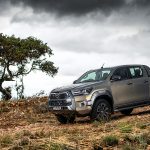Choosing the right truck for the job
Choosing the right truck for the job
One of the most important considerations when buying a new bus or truck is selecting the right vehicle for the job: one that is suitable for the particular type of operation to be performed.
Choosing a new vehicle is not always an easy task. Many factors have to be considered – whether the vehicle is fit for the purpose for which it will be used, for example, or whether the manufacturer provides back-up service. These guidelines can be used in choosing the vehicle most suited to particular applications:
• Determine the payload to be transported and endeavour to select a vehicle with sufficient capacity to legally carry the payload, giving maximum productivity.
• Give some thought to your business’ expected growth. If necessary, buy a larger vehicle to accommodate forecasted increase in capacity.
• If your selected vehicle is a rigid unit, consider buying a vehicle with sufficient pulling capacity to pull a trailer when your business grows.
• Deciding on vehicle power must be based on the power needed to do the job. A unit with more power than necessary will use a lot of fuel. You therefore need to investigate your operating conditions.
• In the medium commercial vehicle (MCV) category, vehicles which cover long-distance, high-speed routes usually require more power (kW) and torque (Nm) to handle wind resistance than those involved in local, slow, distribution type of work.
• In the heavy commercial vehicle (HCV) category, many professional hauliers, as a rule of thumb, rely on a power to weight ratio of 180 kg per kW. (Note that this ratio is only a guide and applies to solely to big rigs.) The best way to determine the required power and torque rating is to ask your truck dealer for a tailor-made performance calculation.
• Carefully examine retardation features such as retarders and intarders to make sure your vehicle will be safe on downhills, especially if you are operating in hilly conditions. This will reduce expensive brake maintenance costs and downtime.
• Strength and flexibility of a vehicle’s chassis should also be examined for its suitability to your applications. Some vehicles are designed for highway operations and, when operated in rough conditions, the chassis lacks the flexibility and strength to cope.
• Rear suspension fitted to truck derivatives in South Africa can vary. Make sure the vehicle you buy is equipped with the correct suspension for your operation. Suspensions designed to operate on highway road conditions can be very expensive to maintain if operated on dirt roads.
• Lastly, but most importantly, ensure the vehicle is supported by a manufacturer or dealership that offers full back-up service. Remember, the vehicle can generate income only when the wheels are rolling.
Published by
Focus on Transport
focusmagsa




